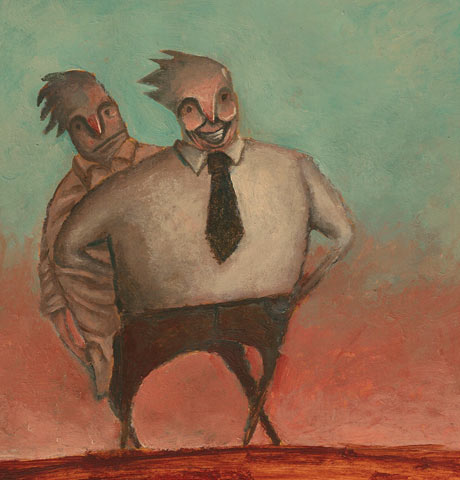
The people to whom I'm closest are, I'm guessing, similar to those closest to you: they have good days and bad days; they're often upbeat, sometimes depressed; occasionally, they experience major crises; and when you get them talking, usually over alcohol, they'll almost all prove more insecure than they'd ever admit in public. But my casual acquaintances are a different story. Judging by their Facebook updates, their tweets, their sporadic group emails and our infrequent conversations at parties, their lives are one long sequence of breathtaking road trips, beach holidays, perfect weddings, exciting new jobs and adorable new babies. They are, in short, monumentally aggravating, and I'd unfriend them in a trice, except that it would be even more aggravating to suspect them of having so much fun behind my back.
While it's conceivable that my friends and family are a particularly catastrophic bunch, the real explanation is obvious: it's only those with whom I'm most intimate who let me see the unvarnished reality. That's a timeless truth, of course, but there's a strong case to be made that these days it's worse than ever: thanks to Facebook and other social networking sites – and the frictionless ease of electronic communication in general – it's far easier to maintain weak quasi-friendships, and thus to hear the burnished versions of far more lives. "In my trips back [home], I have been struck… by the discord between people's Facebook lives and what they say in private," writes the blogger Stan James at wanderingstan.com. "On Facebook they have been on an amazing vacation... in person they confess [it] was a desperate attempt to save a marriage. On Facebook they have been to glitterati tech conferences. In person they confess they haven't been able to sleep for months."
As James notes, people have long made the error of contrasting themselves unfavourably with television stars, imagining they know them when all they really know is a carefully edited presentation. But with quasi-friends it's worse, because they're people we've actually met; it's thus even harder to remember we're not seeing the full picture. It's like an unceasing stream of round-robin letters, crowing about little Jessica's triumph in grade 3 sackbut. And you can't even blame the quasi-friends: in the semi-public world of Facebook and its ilk, they're hardly going to reveal their disappointments and sadnesses, are they?
Analogous problems of vantage-point crop up regularly. The much-studied "impostor syndrome", for example, relies on the fact that you can never really know the self-doubt behind other people's achievements, only your own. The same goes for organisations: corporations and governments seem ultra-professional – until you get an inside view, whereupon they're revealed to be seat-of-the-pants operations where almost no one knows what they're doing.
Not that quasi-friends are entirely bad. Sociologists have shown that "weak ties" are as crucial to the flourishing of social networks as strong ones; more quasi-friends probably also means more job opportunities, and more chance of making real friends, or meeting the love of your life. Perhaps all we need is some kind of technological fix, to display a message under every chipper status update, and as a permanent subtitle on numerous television shows: "Don't forget: this person is barely holding things together."
oliver.burkeman@theguardian.com

